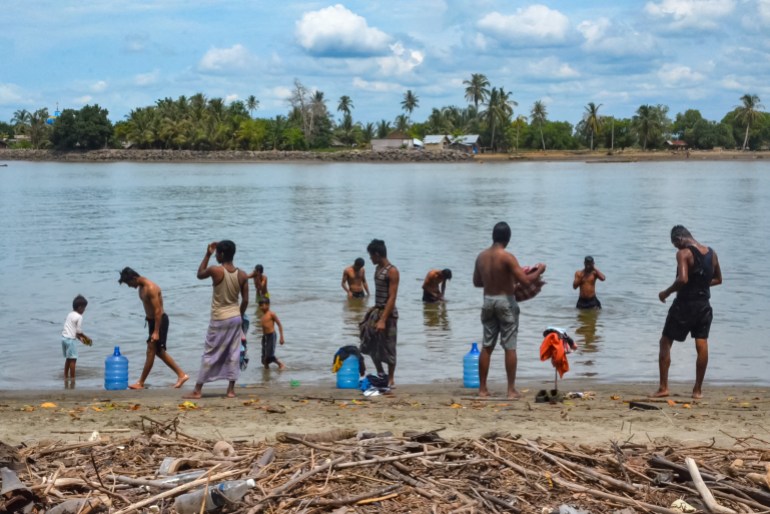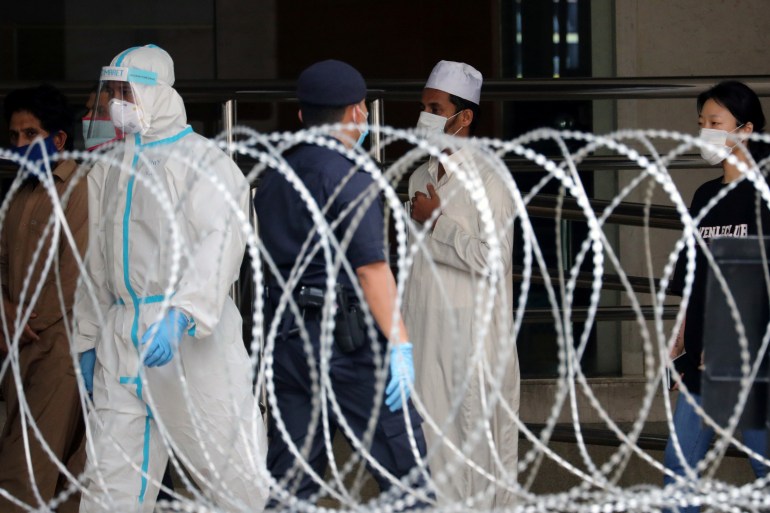In COVID hit Asia, mixed messages on refugee vaccinations
While refugees in Aceh get jabs, those elsewhere worry about being forgotten – or arrested as the pandemic continues to spread.

Medan, Indonesia – Earlier this month, dozens of Rohingya refugees landed on a deserted island off the coast of Indonesia’s Aceh Province.
The refugees had been at sea for more than 100 days, having left Cox’s Bazar in Bangladesh in a rickety wooden fishing boat, and were spotted huddling on uninhabited Idaman Island by local fishermen who used the island as a rest stop between fishing trips.
Keep reading
list of 4 itemsAustralia urged to cut numbers in immigration detention
Myanmar’s pro-Rohingya social media campaign gathers mass support
Bangladesh puts Rohingya camps under lockdown after COVID spike
By June 5, just a day after their arrival, all 81 refugees, including children, had been vaccinated against COVID-19.
“The refugees were vaccinated in conjunction with the local government,” Nasruddin, the humanitarian coordinator of Geutanyoe Foundation, an NGO which provides education and psychosocial support to refugees in Indonesia and Malaysia, told Al Jazeera.
“When we found them, they were in a crisis situation on the island with no food, water or electricity, so local residents brought them food and we also brought them 50 tanks of water,” he added. “The feeling on the ground was that we needed to share our vaccines with the refugees in order to protect them as well. No one complained that the vaccines were being given to refugees.”
Aceh Province has been widely praised by humanitarian groups, NGOs and the general public for vaccinating Rohingya refugees, but elsewhere in Southeast Asia, asylum seekers, refugees and migrant workers have not been so lucky.
Hard line
When Nasruddin assessed the 81 refugees on Idaman Island, they told him that they had wanted to go to Malaysia. Some had family members who were already living there, while others were under the impression that the country had a more liberal policy towards refugees than its neighbours.

But like most countries in Southeast Asia, Malaysia is not a signatory to the United Nations Refugee Convention and while the government has said it will vaccinate everyone living in the country, it has also taken a hard line on undocumented migrants and refugees, including Rohingya.
“In February, the cabinet decided that in the interest of pandemic recovery all foreigners would receive vaccination free of charge, including refugees and undocumented migrants,” Lilianne Fan, the co-founder and international director of Geutanyoe Foundation who is based in Kuala Lumpur, told Al Jazeera.
“The COVID-19 Immunisation Task Force and Science Minister Khairy Jamaluddin as coordinator of the vaccination programme, have been vocal advocates of this approach.
“However, the recent statement of the minister of home affairs that those without valid documents should not be vaccinated, combined with renewed crackdown on undocumented migrants, contradicts the government’s earlier position and will simply drive more people into hiding and slow down Malaysia’s pandemic recovery.”
Malaysia went into its second strict lockdown at the beginning of June after cases of coronavirus surged – stretching hospitals and intensive care units to the limit. The health ministry announced 6,440 new cases on Friday.
The government has indicated that it will ease the lockdown as more people are vaccinated, and Khairy has consistently stressed that the programme will include everyone living in the country.
Why were the authorities spraying disinfectants on undocumented migrants during the operation last night?
What is the purpose of doing so? Won’t that be harmful to their health?
I hope @KKMPutrajaya @DrAdhamBaba @DGHisham can advise them properly. pic.twitter.com/JJqXwyIGU9
— Norman Goh (@imnormgoh) June 7, 2021
But as it did during last year’s first lockdown, Malaysia has once again stepped up operations against undocumented migrants.
Malaysia’s Home Minister Hamzah Zainudin has declared that PATI – the acronym for undocumented people in the Malay language – will be detained and sent to immigration detention centres.
This month, he stressed that undocumented migrants had to “surrender” before they would be vaccinated.
In early June, a video from state news agency Bernama showed 156 undocumented migrants from India, Pakistan, Bangladesh and Myanmar being sprayed with disinfectant in Cyberjaya, near Malaysia’s international airport, after they had been detained.
Last week the immigration department shared a post on its Facebook page – styled like a poster for an action movie – with the headline “Ethnic Rohingya migrants are not welcome”. After an outcry, but not before it had been widely shared among refugee communities, it was deleted.
The Human Rights Commission of Malaysia on Monday expressed concern at “recent statements portraying migrants, undocumented or irregular migrants, refugees and asylum seekers as a threat to the safety and security of the country and a risk to the health of Malaysians” and urged the government to rethink its approach.
“Instilling fear through threats of arrests and detention of undocumented foreigners is counterproductive in light of ongoing efforts to overcome the pandemic and achieve herd immunity,” it said, stressing the clear differences in the situations of migrant workers, and refugees and asylum seekers.

Rohingya made up about 57 percent of the 179,570 refugees registered with the United Nations High Commissioner for Refugees (UNHCR) in Malaysia at the end of May.
Unofficial estimates suggest the country may have as many as three million undocumented migrants, according to the International Organization for Migration.
Widespread problem
The mixed messaging on vaccinations for refugees is not exclusive to Malaysia.
In a statement released in early June, the UN refugee agency warned that a shortage of vaccines in the Asia Pacific region was putting the lives of refugees and asylum seekers at risk.
“Refugees remain especially vulnerable to the spread of COVID-19. Overcrowded settings, coupled with limited water and sanitation facilities, can contribute to increased infection rates and an exponential spread of the virus,” UNHCR spokesperson Andrej Mahecic said in the statement.
There are almost 900,000 Rohingya refugees in Cox’s Bazar, making it the single largest and most densely populated cluster of refugee camps in the world. According to Mahecic, the number of COVID-19 cases in the camps has increased dramatically in the last two months.
As of 31 May, there had been more than 1,188 confirmed cases among the refugee population, with more than half of these cases recorded in May alone.
None of the refugees in Cox’s Bazar has yet been vaccinated against COVID-19.
Mahecic added that, in many countries in the Asia Pacific region, there were not enough vaccines to go around, leading to groups such as migrant workers and asylum seekers being sidelined.
The UNHCR had observed a “worrying increase” in the number of coronavirus cases among refugees and asylum seekers in countries including Thailand, Malaysia and Indonesia, he said.
Indonesia, at least, appears to be starting to do more to address the problem.

Other parts of the country have started to follow Aceh’s lead, according to the IOM, which vaccinated more than 900 refugees in the Indonesian city of Pekanbaru in Riau Province in early June in collaboration with the local government.
“IOM applauds the response of the City Government of Pekanbaru for making vaccines available to the refugee community in the city,” Ariani Hasanah Soejoeti, the national media and communications officer of IOM Indonesia told Al Jazeera, adding that all refugees in the city over the age of 18 have now received vaccines.
“Vaccines are one of our most critical and cost-effective tools to prevent outbreaks and keep individuals and therefore entire communities safe and healthy,” she said.
“The virus knows no borders or nationality; and neither should our solidarity.”